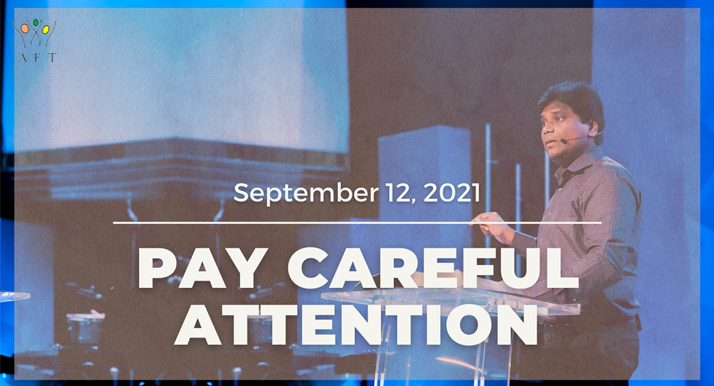
So great a Salvation (Vol.15): Pay Careful Attention
Sunday English Service – 12 SEP 21
Transcript
For the last many weeks, we have been looking at our great salvation series of messages and our salvation and the blessings of our salvation, how great our salvation is. And today I want to bring this series to a conclusion. Even though there are other things that we could possibly cover, we can keep on talking about more stuff because our salvation is truly so great. The things that God has prepared for us, no eye has seen, no ear has heard, nor has enter into the mind of man or heart of man. The Bible says is so great that you really can’t cover it all. And even if I keep on speaking on it, we can’t cover it, but we’ve given you a brief tour of it, given you some of the important aspects of it. The reason I preach this series, all these messages on our salvation is because we need to know what a great salvation we have received. We need to have that knowledge as a believer, every believer needs to know, needs to have that knowledge of how great our salvation is. And we need to live with that awareness that we have received something very great from God, a great salvation. When we live our lives with this knowledge and awareness of how great the salvation is that we have received, then we can face anything that comes our way. When you know that you have something so great that nobody can touch a takeaway, then no matter what comes against you, it cannot shake you. You have something that no one or nothing can touch or take takeaway. Think about some of the stuff that we have seen in the cities. I mean, who or what can take away the fact that you are saved from sin, saved from hell forgiven and cleansed accepted as righteous before God you tell me, can anything change that?
Yeah, the world may throw this at you or that at you, but can it change this truth my friend? That you are forgiven and cleansed accepted as righteous now and forever in Christ. And it changed the fact that you are born again, given the nature of God, already sanctified in one sense, and the problems in this world cut you off from Christ. We saw how we are joined to Christ, one with Christ, united with him, we are in Christ, he is in us. And we saw how deep this union is, its like the vine and the branches. It’s like the head and the body. And we saw how beneficial to us this union is, whatever is in Christ is in us, because we are in Christ and he is in us, his life, his strength, his wisdom, his health belongs to us because we are in union with Christ. What a great blessing. No more what you have or don’t have. If you have this, this is enough for you to pick yourself up and keep going forward. Then we saw how we are children of God. God is our father. Not only is Christ our husband, but God, the father is our father. We are his children. We are also sons of God, we saw. We saw what that means, how we have the highest honor and status and rights and inheritance in the family of God. That’s why the Bible calls us as sons. We’re sons and daughters of God, not just children of God, sons and daughters on paper, not just called sons and daughters, but we are really sons and daughters in the family of God with a real intimate relationship with God, our father, we can call him Abba father and he embraces us and manifest his love to us through the holy spirit. All this we saw.
The last time we spoke a couple of weeks back, we look at our inheritance, our great inheritance. God actually treats us as sons and gives us the inheritance that a son would get. Every believer son and daughter of God gets a great inheritance. We saw what all is in our inheritance. We inherit the kingdom itself. We inherit the world to come and we inherit rulership of the world to come and so on. We will rule and reign with Christ. We inherit everything, God himself, because we are his children. I just reviewed what we saw for the last 14 weeks. This is the 15th week, we’re speaking on this. And there are many things I am not even covered. There are other things in salvation. For example, if I had to go beyond this and talk about something even greater, possibly, we could talk about how we will one day see the face of Jesus. We will be face to face with Jesus and what a great experience that will be. But I’m not going to talk on that. I’ve spoken on that on Tuesday evenings. That is at the heights of the blessing we will one day enter into. What I’m trying to say is I spoke all of this so that you will get an awareness of how great this salvation is. And I hope you have that sense of all and amazement thinking of your salvation. It should amaze you. It should cause you to go wow, such a great salvation. That’s why I spoke on this.
And I want to bring this series today to a conclusion by telling you this very important point today. What do I want to tell you today? Very important, here it is. This is what I want to say today. I want to say pay very careful attention to the things that you have heard, to these kinds of truths, the truth about your salvation. That’s what I’m trying to say today. My main point today in today’s message is this my friend here it is, pay close attention, keep paying close attention to these truths. That’s it. That’s my message for today. Keep paying close attention to these truths. The message is not over, but that’s my main point. That’s what today’s message is all about. I’m here to simply say to you, you saw all these, keep paying attention to these truths carefully. Now, you may say that’s not really worthy of a message. How can that be the main point of a message? But it is. And I think it is worthy. And let me tell you where I got this idea from him, where did I get this idea to end this series by having this as the last message, which simply says, keep paying attention, careful attention to these truths. Where did I get this idea from?
I got it from Hebrews chapter 2, verse 1 to 4. I’d like you to go there. Hebrews chapter 2 verses 1 to 4. And as you’re turning there, let me tell you how important Hebrews 2:1-4 is. Let me tell you why it is important for us today in the series, as we are ending this series, why this passage is so appropriate for us today. You see just like us, you and me, the writer to the book of Hebrews, the author has been thinking about this great salvation, has been meditating on this great salvation, and it is with this great salvation in mind that he writes these words that we are about to read in Hebrews 2:1-4. I want to show you that. So I’m taking you here because just like we’ve been looking at this great salvation, and we’ve been trying to get an awareness of how great it is. This author also has this great salvation in mind, and he writes with that in mind. And why I’m taking you here is, he tells us what we should do with it. Now that we have received this great salvation, what should we do with it? I mean, there’s a hundred things that we could do, but what’s the one very important thing we should do with it. He gives us a very important application. He tells us here it is do this one thing because you’ve received this great salvation, do this one thing, and guess what he says.
He says, what I told you, pay careful attention to these truths, pay careful attention to these truths. That’s what he says. I’ll show you. He says it in verse one itself. Pay very careful attention to these truths. That’s what he says. And that’s my message today. So this passages is very appropriate for us because he’s also talking about our great salvation and he gives us an application and says, do this one thing because you’ve received this great salvation. And not only that it’s appropriate for us today because there is a similarity between us, you and me and the original audience of the book of Hebrews, original audience. We are reading this today in 2021 in Chenei or wherever you are. But this was originally written to who originally read the book of Hebrews first. There was an original audience, right? 2000 years ago, approximately it was a group of Christians to whom this was written. Let me just tell you something about those that group. They were most likely Christians who came from the Jewish background. So they were Jews who then became Christians believers. And what had happened by the time this book was written is they started to face persecution from their own people. That is the Jews. Other Jews started persecuting these Jews who became believers. Forget about the Romans persecuting. Their own Jewish brothers started persecuting them because they had now accepted this Jesus as their Lord, as Jesus or died on the cross. And this was too much for some of the other Jews to take. And so they began to be ostracized, pushed away the, their own society, their own brothers, their own kinsmen, their own people, they’re pushing them away, their own people were torturing them. Their own people were giving them a hard time. Their own people were persecuting them because they were Christians. This is what this original audience was going through. It is during that time that this book is being written to them. This letter Hebrews.
I see a similarity between those people, that original audience and us today. What is the similarity? It’s not that we are being persecuted like them because most of us are not being persecuted like them. Most of us, I don’t think our main problem is that — I’m talking about most of us our main problem is not that people are taking away our lands and houses and money because we believe in Christ or something like that. It’s not so bad. We are not persecuted like them, at least most of us are not. There are people in the worldwide persecuted, but that’s not what most of us are going through. Then what is the similarity between us and them? I’ll tell you what the similarity is. They were living those people, that original audience was living in a particularly difficult time, difficult season, just like us. That’s the similarity. Today even we are living in a particularly difficult season, more than before. This is a difficult season to live in this world. The pandemic is happening and all these things, the effects of that and navigating through all that. It’s not like before, it’s a difficult season, you may say. And we need these kinds of truths in these kinds of difficult seasons. That’s what I’m trying to say. I think this passage is very appropriate for us today. Not just because of its focus on salvation and because it tells us what we should do about it, but also because it is written to people who are going through difficulties and just like a soap. So that’s why I take you to Hebrews 2:1-4. And what we’re going to do today is we’re going to bring the series to a conclusion by looking at Hebrews 2:1-4.
I’m going to show you first how in this passage right here in this context, the writer has our great salvation in mind, just like you and me. He has been thinking about this great salvation. And then secondly, I’m going to show you that he actually tells us to pay attention to this, keeping attention to this, pay more attention to this. That’s what he’s trying to say. That’s the main thing we need to do. He says, and we’ll talk about what that means and all that. And then thirdly, I’m going to show you what will happen if we don’t pay attention, because he does this passage does that. It tells us what will happen if we don’t pay attention. We open ourselves to real dangerous. This passage gives us a warning of what will happen if we don’t pay attention to this great salvation and the truths about it. So that’s what we’re going to do today. First let’s read Hebrews 2:1-4 and let’s — we’re going to talk about it. So today the main point, once again, before I read this, the main point of today’s message is what pay attention to what you’ve heard. Pay attention to what we’ve been talking about all these many weeks, continually, keep paying attention to these kinds of truths. That’s all I’m trying to say.
This is not my message. I’m telling you this because it’s the message of Hebrews 2:1-4. And I believe it is God’s message to you. Let’s read Hebrews 2:1-4. Therefore, we must give the more earnest heed to the things we have heard, lest we drift away. But if the word spoken through angels proved steadfast and every transgression and disobedience received a just reward. How shall we escape if we neglect so greater salvation which at the first began to be spoken by the Lord was confirmed to us by those who heard him. God also bearing witness both with signs and wonders with various miracles and gifts of the holy spirit, according to his own will. So first I wanted to see that he has this great salvation in mind. You should have heard that term in verse three in English. It says, how shall we escape if we neglect so greater salvation, what a way to refer to salvation. So greater salvation this entire series I’ve named like that. So greater a salvation it is taken right out of Hebrews chapter 2, verse 3, this passage, which we read. So greater salvation. That’s the name of this series? The way he says it itself tells you, he’s been thinking about it, and he’s been thinking about the greatness of it, and he has a sense that is he so great. And he says so greater salvation. Not only does he have it in mind and not only does he actually mention it in this passage, even before and after this passage in the entire context surrounding context, you will see, let me show you that he has this in mind. What? Our salvation in mind and then this great salvation in mind when you read the Bible and you try to understand the Bible. One very important principle is this, always understand it with its context. Don’t just look at a verse or two verses and just pick them up and look at them in isolation. Look at them in their context, see what comes before, see what comes after, understand it in its context. It’s very important when you’re doing Bible study. I want to show you that not only in the passage, chapter 2 verse 1-4, but even before and after in the surrounding context, this is big in the author’s mind. Look for example at the previous verse, our main passage today begins in Hebrews 2. But look at the previous verse. The last verse of chapter 1, Hebrews 1 verse 14, look at that. Are they not all ministering spirits sent forth to minister for those who will inherit salvation? See that? Inherit salvation. Again, in the previous verse also he is thinking about those who will inherit salvation.
If you keep going back before our passage, in fact, let’s pick it up from Hebrews 1:1 itself, and I’ll give you just a brief overview of context, of what’s in his mind. What’s big in his mind as he writes this. If you read the book of Hebrews from chapter 1, from the beginning itself, you will see that the biggest thing in the author’s mind is this. There’s a couple of things, right? Two layers. The first layer, the biggest thing in the other’s mind is the superiority of Jesus. How Jesus is superior to all these other people who were superior in the old Testament, the great prophets of the old Testament, the Jews thought they were the greatest. The prophet Elijah, the prophet Isaiah, the prophet so-and-so they thought the prophets were the greatest. Now, if you read Hebrews chapter 1, just the first four verses the writer will tell you that Jesus is far superior to the prophets because he’s not just a prophet, He’s a son, God spoke to us in times past through his prophets. But now in these last days, he has spoken through his son himself, in his son himself. He is far superior. The prophets are nothing compared to Jesus, his superiority of Jesus, and you keep reading chapter one. He talks about how Jesus is not only superior to the prophets. Next, he shows how Jesus is superior to angels. Angels also very big in the minds of the Jews. Those Jewish people. He’s writing to people from the Jewish background. And for them, angel is a big deal, right? Angel appearing is something huge.
And so he’s writing to them. They’re thinking angel are the biggest and he is saying Jesus is superior to the angels. You’ll see this in chapter one verse seven onwards. Six onwards, how Jesus is superior to the angels. And he keeps building that case and he comes down all the way to verse 13. That’s the main point. Jesus is superior. Jesus is superior. And then comes verse 14 at the end of chapter one where now he adds another layer to it. So far, he’s only talking about the superiority of Jesus, but now there’s another layer added here in verse 14. He’s saying, if you look carefully, he’s not talking just about the superiority of Jesus, not in verse 14. The beautiful thing about verse 14, he is shifted a little bit and added another subject here. Not only is Jesus superior to the angels, in a sense, even believers are superior to angels. Why do I say that? In verse 14, he talks about how angels are sent forth to minister, to minister means to serve. Serve who? Those who will inherit salvation. Who are they? Believers. Remember, last time we spoke, we spoke about our inheritance, how we will inherit the world to come. How we will inherit the kingdom that God has prepared for us, how we will inherit all the promises of God. We will inherit the rulership. We will rule and reign with him all, and you think inheritance, you think big, massive. He is thinking about believers inheriting all of that.
And he simply says it as inheriting salvation. That’s a shorthand, which means inherit the everything that God has for you. He’s saying the angles are there to those — angles are there to minister to the heirs, those who will inherit salvation. Angle is not the heir. He is there to serve the heirs. He’s basically saying not only, you see that he has now added this other element. Not only is Jesus superior to angels. Those who believe in Jesus are also superior to angels because they now become heirs of God. Go heirs with Christ, inheriting salvation. If you keep reading next comes our passage. 2:1-4. Then if you come to verse 5, he again has this in mind that in way believers are superior to angels. Look at verse 5. I want you to see this. I’m saying all this to show you that he has in mind throughout the surrounding context, this great salvation, how not only is Jesus in an exalted state, but those who believe in Jesus are pulled up to a very high state, even more superior to angels in a way. Look at verse five, Hebrews 2:5, right after our passage, for he has not put the world to come of which we speak in subjection to angels. That means God has not said, God has not assigned angels to rule the world to come, the new heavens and the new earth, then whom has he assigned it to? Verse six, it has been testified somewhere, what is man that you are mindful of him or the son of man that you care for him? What’s he doing? You saying, you know that it is written somewhere. Where? He’s actually quoting Psalm 8 to these Jews who know very well what this is. Purposely, he telling it in a way it says somewhere, what is man, that you are mindful of him or the son of man that you care for him. These Jews know very well where it is. It’s in Psalm 8 and they know who said it. The Psalmist said it and they know what it is about. What is it about?
It is about how God has exalted man to a very high state, Psalm 8. What is Psalm 8 about? One of the main things in Psalm 8 is the Psalmist says, God, you made the sun moon and the stars, but what is man that you are mindful of him? Why do you pay so much attention to man, when man looks so small and insignificant compared to the rest of creation? What he’s doing in verse 5 and 6. He is saying, God did not write as an inheritance the world to come to angels. God did not assign angels to rule the world to come. Instead, He has prepared it for who? Human beings, for believers. That’s what he’s saying. And he’s saying your one Old Testament says it, don’t you know? And he keeps quoting Psalm 8 and he continues in verse seven. Look at verse seven, you made him a little lower than angels, but you have crowned him with glory and honor. What does he mean? He’s saying, man in one sentence is a little lower than angels. But in another sense, he is crowned with glory and honor, and you put everything in subjection under his feet. Now in putting everything in subjection to him, he left nothing outside his control. See what he’s saying? He’s quoting Psalm 8, and he’s saying in one sense, man looks lower than angels. But in another sense, he’s got what angels never got. He got the authority to rule and reign over this world. God didn’t look at an angel and say be fruitful, multiply, fill the earth, subdue and dominate everything. He looked at Adam and said it. He planned rulership for Adam. He gave authority to mankind and he put everything in subjection to him, left nothing outside his control.
Then look at verse eight, the second half, at present we do not yet see everything in subjection to him. He is saying all this happened, but in the present, if you look at the world, you don’t see man ruling and reigning. You don’t see everything under man’s feet. Instead, it looks opposite. Everything seems to be ruling, man, right? And then now comes the turning point, verse nine, But we see him. What he’s saying is you don’t see man ruling and reigning, but we see him. Who? For a little while was made lower than the angels namely Jesus crowned with glory and honor because of the suffering of death. So that by the grace of God, he might taste death for everyone. What he’s doing, he’s saying, God didn’t plan rulership for angels. He planned rulership for men, but man messed it up, and man is not ruling and reigning now we don’t see everything under his feet, but we see someone who was in a sense, made a little lower than the angels. Jesus is far higher than angels, but when he became a man, because in his humanity, in one sense, you can say he’s a little lower than the angels, Jesus, but now we see him crowned with glory and honor, unlike angels, higher than angels. What he’s saying, you know what he’s saying? God’s plans for man were not, they could not come to fulfillment by man alone, man messed it up. But then that’s why God sent his own son to become flesh, to become a man, to live as a man, die as a man for everyone, taste death for everyone. You see that. And then now he’s risen again, crowned with glory and honor ruling and reigning far above the angels.
In other words, he’s saying what God intended for man is now come to fulfillment through Jesus, the perfect man. In fact, this is the first time in the book of Hebrews that the author uses the name Jesus. Before this, he refers to Jesus only as the son and so on. Purposely, here he says for the first time, we see Jesus, he started calling attention to the humanity of Jesus because Jesus is his human name. It was a name given when the son of God was born in this world. He didn’t have that name before. Only when he was born in this world as a human, he was given that name and he’s pointing. What he’s saying is what man could not do, this perfect
Man Jesus did. And he died. He rose again. Now he’s crowned with glory and honor where man could not go. This perfect man has now gone right to the top and everything is under these feet. Amazing. And then in verse 10, he doesn’t leave it at that. In verse 10, he says, not only has he gone right to the top, he has gone there so that he can bring others right to the top. Verse 10, look at verse 10, for it was for whom and by whom all things exist in bringing many sons to glory should make the founder of their salvation perfect through suffering a lot of words, but does that bringing many sons to glory? We are sons of God. What is this? God doing? His bringing many sons to glory. Already, His son has gone into glory, fully glorified. Now he’s bringing many sons to glory. You see what’s happening. What’s in his mind is two things. One is the superiority of Jesus. The greatness of Jesus. He’s the son of God. He is far superior to prophets and angels than anybody else. But then those who believe in this, Jesus, no matter how ordinary they are, the most ordinary believer in this great Jesus is then elevated to his level. No equal to him, but he becomes squares with this Jesus. He receives a glory like unto this, like Jesus, God, in one day we are going to actually receive a glorious body like Jesus himself has. One day, we are actually going to shine like the stars. There’ll be a shine to us, literally a glory.
What he’s saying is this Jesus has entered into glory in our place, in our stead. Not only as God, but also as man so that he can pull us into glory. In fact, we have already put a step into glory and one day fully, we will enter glory. Such a great salvation is planned for us. What is in his mind, the greatness of Jesus, but also that great salvation that has been provided in and through Christ for the believer, which elevates us from an ordinary level to something extraordinary. This is what he has in mind as he writes Hebrews 2:1-4. With all this in mind, you see all this is in his mind. He’s thinking about the greatness of Jesus, the greatness of believers who believe in Jesus and what God has planned for them. There’s amazing salvation. There’s amazing inheritance. One day, they’re going to rule and reign with Christ. All this he has in mind and he writes Hebrews 2:1-4 and he says, do this one thing. What is that one thing? Let’s go to the next thing.
Salvation is in the context. Now look at Hebrews 2. What is the one thing we should do now that we’ve received this great salvation. Verse 1, Hebrews 2 verse 1. Therefore we must pay much closer attention to what we have heard. See that. You’re saying you got such a great salvation. Now what you to do with it? What’s the application. What’s the take home thing to do? What do you do with it? Pay much closer attention. That’s the main point today. We have heard about this great salvation for many weeks. What should you do with it? Pay much closer attention, pay very careful attention, some translation says. Pay the greatest attention, some translation says. The same thing is said in verse 3 in a slightly different way. The same point comes out in verse 3 in a slightly different way. Look at verse 3. What should you do with this great salvation? Don’t neglect it. That’s what he says in verse 3. How shall we escape if we neglect so greater salvation. Neglecting means what? To not pay attention. If you’re paying careful attention, that is very good. What’s the exact opposite of that. You’re not at all paying attention, which is what? You’re neglecting it. So it’s like, he’s saying the same thing in verse 1 and 3, but just saying it in a different way. In verse 1, he’s saying it in a positive way. He is saying pay careful attention. In verse 3, he is saying don’t neglect. Pay attention to what? Pay attention to what? What does he want us to pay attention to? In verse 1, it says pay attention to the things we have heard. Pay attention to the things we have heard. Now, if you look at only verse 1, that may sound like whatever they’ve heard, they should pay attention, whatever these people heard. Whatever you hear, anything you hear, just pay attention. No, no, that’s why you should look at verse 1 in light of verse 3, interpret everything in its context.
You look at verse 3, it comes out a little more clearly. How shall we escape if we neglect so greater salvation. Verse 1 says, pay careful attention to what you heard. Verse 3 says, don’t neglect. What? So greater salvation. Basically, what he’s trying to say is pay careful attention to the truths concerning salvation, pay careful attention to this message concerning salvation. Pay careful attention to the gospel. What is the gospel? The message that brings salvation. The gospel is the power of God unto salvation. Pay careful attention to the message. What message? The message concerning Christ, who he is, what he has done, what it means for you. What all is in your salvation, how great it is. Pay careful attention to these kinds of truths about salvation. Notice how it is said. Notice carefully. You got to read the Bible carefully, understand carefully. Does not say God, your salvation. He does not say, be careful with your salvation. Got it. No, He doesn’t say that because God is the one who guards our salvation, not us. But what does he tell us to do? Pay careful attention to the things you heard about salvation. Pay careful attention to the message of salvation. The gospel. Pay careful attention to — in this passage itself what was first spoken by the Lord.
The focus here is on the message. Can you see that? What you heard, the word spoken?
What was spoken by the Lord? What’s he saying? He’s saying, pay careful attention to the truths about salvation, to the truth, to the word, to the message. He’s not saying God, the salvation, your salvation, you’re finished. No, what is your role? You just pay attention to the truth man, about salvation. That’s what he’s saying. There’s a hundred different things we can do with our salvation. And we ought to do, if we are saved, if you have received such a great salvation from God, we are expected to apply it in a hundred different ways, thousand different ways in our life. But the number one thing we are expected to do is pay careful attention to it, to the truth of it, the truths consenting it, to the message, to the word about it and keep paying careful attention. If we will do this one thing, the other thousand things will follow from it.
Listen we’re saved means we are expected to do a lot of things. If we ae really saved, then we got to live a transformed life. We got to love our neighbor. For example, we’ve got to do good works. For example, good works don’t save us. But if you’re really saved, you’ll end up doing.
But the thing is, how do you go from this to that? How do you go from salvation to its results? This is the key right here. Pay careful attention to the truths of salvation. The word, the message about salvation, it’s details. It’s truths. You keep paying attention to that and that will move you prod you, push you, enable you to do the good works, to love your neighbor, to live as a witness and so on. There’s a hundred different things we ought to do and we can do, but this is the number one thing you do with your salvation. You pay attention to the truth of it, the message, the words, the truths, who is Jesus? Again, and again, you keep going back to these truths. What did he do? What does this death mean? What does his resurrection accomplish and what this means for you? What you get out of it and how your life is different as a result of it, you pay careful attention to that. That’s what he’s saying. What he’s saying is don’t neglect that don’t neglect this matter. Don’t forget about it. Don’t say yeah. I heard about the salvation. Yeah. I’m saved. Yeah. I know about this. And I’ll now move on to some great higher truth. Don’t say that. He says, don’t say, oh, gospel is [inaudible – 00:36:59] I’ll move on to some greater higher levels of truths now. That’s what he’s saying, don’t do. He is saying pay careful attention to what you heard and sending the things of salvation, because this is the most important message in Christianity.
Paying careful, attention is important for the whole Bible, but even within the Bible, there are certain things that are prioritized. Everything is the word of God, but even within it, certain things are prioritized as the core. This is the most important thing that the gospel, the message concerning Christ, who he is, what he has done, what this means for you. How this brings you salvation. That’s the core. This is the thing you got to pay the most attention to, got to keep going back to it. Keep listening to it, keep meditating on it. Keep hearing it even after the series ends. And that’s why I’m talking about this today, because I’m going to end, but you shouldn’t end, I shouldn’t end on a personal level. We keep looking at it. Keep paying attention. I think we all need this reminder today because sometimes, believers, themselves think that a truth is about salvation, it’s not for them. Salvation, for example, if you try to teach about the gospel and all that. They’ll tell you gospel is for unbelievers. Gospel is not for believers. We know gospel. We are saved. Why do we need gospel? Go teach the unbeliever. But preach the gospel to unbelievers. No, my friend, the gospel is for both unbelievers and believers. Unbelievers need to get saved by hearing the gospel. Believers need to understand the gospel because they don’t understand the gospel, only it is getting messed up everywhere. That’s why the new Testament always focus on the gospel. You read the epistles. Every epistle will focus on — Romans first eight chapters has expound the gospel. Ephesians, the first few chapters talks about the salvation and the blessings we get, how we are saved. Colossians is a similar.
Even in Hebrews, it talks about that. It reminds the people of this great salvation. What I’m trying to say is the attitude that we are saved and we know about salvation. We all know about gospel. Now let us move on to higher truths. That’s a very prevalent attitude. People want to hear something so-called, high-end great. And even preachers sometimes go in that direction. So people are interested more in what’s in the third heaven, what is Paul’s thorn in the flesh? And shall we dance or not in worship. That interests them, peaks their interests. And they want to listen to that. They pay careful attention to that. Shall we shine the lights or no? Everything is important. I’m not saying everything is not important. Everything is important, but everything has its level of importance. Without paying attention, careful attention to the most important things. People, both preachers as well as believers are paying attention to the less important things. That’s a terrible problem my friend, because let me go to the third point, the third point, the division of this sermon. First we saw how he has this great salvation in mind. Second, we saw how he’s telling us to pay careful attention to the truths concerning the salvation. Now, thirdly, in order to really make us do it. He tells us what will happen if we don’t pay careful attention. He gives us a warning. That’s what I want to look at for the rest of the time, the warning that he gives us in these verses, he gives us a warning. What will happen if we don’t pay careful attention to these kinds of truths.
He warns us specifically of two dangerous danger. Danger number one is found in verse one. Therefore, we must give the more earnest heed to what we have heard, lest we drift away from it. Did you hear that? What’s the danger? We must pay closer attention to what? We’ve heard lest we drift away from it. What’s the danger? If you don’t pay attention, careful attention, you will drift away from it, drift away from the truth. Most of the English translations use that terminology, drift away from the truth. And it’s a very good way of communicating the original Greek word there, drifting away. That’s the sense. Drifting away, where is it used most often. It is used most often in the context of a boat at sea, a ship or a boat at sea, which is just drifting. Just imagine, picture a boat. It’s in the ocean, and it’s not anchored. And it is slowly drifting away, according to the wind and the wave. There’s a lot of winded drifts in that direction, you know, in a big way. But even if there’s not much wind, it just kind of slowly drifts by the movement of the waves. Given enough time, it’ll slowly drift far from where it originally was.
What this verse is saying is you got to have that picture in mind. It’s saying, if you don’t pay careful attention to these kinds of truths, these most important, basic Christian truths about Christ and salvation and the gospel and so on. If you don’t pay careful attention, you will slowly drift away from the truth. Now drifting away from the truth is dangerous, man, let me tell you, what’s worse here. What’s dangerous about this drifting, what’s scary about this drifting is when you’re drifting, you don’t even know you’re drifting.
I read a true story of a family on vacation. They had a boat. They had a four-year-old son. They were by a lakeside on the shore of a lake. And for some reason they wanted to go in and get something and they didn’t want to take their four-year-old son all the way in. So they felt it was safer to put him on the boat than to leave them on the shore. They didn’t want to leave him on the shore or on the boat, seemed like a more safer place. So they left them inside the boat. And we’re talking, not a small boat, good size boat. They left him inside the boat and they figured the boat is tied, fixed, anchored, safe. They went and when they came back the boat is gone. And then they had to call in a rescue team and all that. And they found the boat to more than 600 feet away. And they eventually saved the boy and they got the boy and he’s fine and all that. But the thing is it’s a good example of how the whole thing was unintentional. The parents didn’t put the child there thinking no, it’s okay if drifts away also it’s okay, no problem. No, they put him there thinking he is safe. They put in there thinking the anchor was fixed properly, but they didn’t know it was not. The anchor had come off. They didn’t know that because it’s under the water. You can’t see. They just assumed everything is fine. They thought there won’t be any problem, but it became a problem.
Similarly, at times we don’t know. We don’t realize, we think we are anchored and strong and on good foundation, but we don’t even realize sometimes we’re drifting and we won’t realize it until something happens. Even a preacher explains this passage, a preacher, an American preacher. He says to relax, to take some time off, he’ll go fishing. And he says, he has experienced this firsthand, this drifting. He says, when he’s fishing out in the middle of the sea or something, he so engrossed in his fishing because it just relaxes him. That suddenly he looks and he sees he’s in a totally different place, moved away hundreds of feet. And he says, why that is, is something’s happening under the boat, which we don’t realize, which he didn’t realize. The movement of the water or something has shifted the anchor, not realizing it’s gone somewhere. And he says, sometimes we realize when we only face danger, I think it’s similar to the Christian life. When we don’t realize we’re drifting, but we are drifting. And we realize we have drifted far away only when we run into some problem or some challenge, some big problem, some big challenge or some loss comes. We thought we had great faith, and we grew up in the faith and we know all the truth. And we know this and that. And we are so established. But then we find out when the challenge comes, there is fear, not much faith. When the challenge comes, there is a lack of peace. When the challenge comes, it will completely shaken up. That’s when we realized we’re not where we should be. It taught, we were grounded in the truth, we were not. We’re far away from it.
The thing is it doesn’t happen overnight. We realize we have gone away when some problem comes. But the drifting started long ago when we stopped paying attention to the important truths, that’s when it started. Now, listen to me. What he’s saying here is what does it say? He’s very simple. He is saying, if you don’t pay attention, you’re drifting. Let me put it another different way. There are only two options. You’re either paying attention or you’re already drifting. That’s what is it saying. You’re either paying attention or you’re already drifting. My friend, what has been your reaction to the last many weeks that we have been preaching on? How have you reacted to these messages on salvation? Have you reacted saying that this did something for you. This gave you some kind of peace, some kind of hope, some kind of comfort, some kind of joy, do you look back and say, wow, what a great salvation or you look at it and say, what’s the big deal. If you look, if your attitude, if your reaction to these kinds of truths is positive, that is you’re amazed by it. And it’s doing something for you. And you’re saying, wow, what a great salvation, then you’re paying attention. At least now, and I’m saying, keep paying attention. But if your reaction already has been, what’s the big deal? Yeah. I’m saved, so what. Yeah, I am a child of God, what’s the big deal in that? Why can’t we talk about something else? If that’s your reaction, let me tell you my friend, you are already drifting in drifting mode, you don’t even realize it. You don’t even realize it. The best way, the surest way, not to drift. Go back and put the anchor, keep doing it again, and again, anchor yourself in the truth. This kind of truths.
I’m not saying you got to be not like the way I am presenting salvation or something. I’m not saying that. I’m saying you got to have a sense that your salvation is a great deal. That the fact that you are a child of God is a huge deal. You got to have a sense of wonder, like the apostle John behold, what manner of love this is that the father has called us children of God. If that sense of wonder has gone, you’re already in drifting mode. Keep going that way. One day, it’ll end up bad. And the problem comes, then it will be revealed. It’s a real danger. That’s the first danger. If you don’t pay attention, you will drift. It’s only two options. You’re either paying attention or you’re already drifting. So your solution is pay attention. Now let me look at the second danger. The second danger that he points out here is in verse three. If you don’t pay attention, what is the second danger? How shall we escape if we neglect so greater salvation. What’s the danger here? No escape, no escape. It’s very interesting, the passage, the verse doesn’t say escape from what, is because the author himself, doesn’t say from what. If you want, you can supply a word like punishment or injure or bad consequences or whatever there to make it more understandable, but there’s no word in the original. And that’s why they leave it like that in English translations. How shall we escape?
There is no escape, some kind of danger, some kind of bad consequences cannot be escaped if this great salvation is neglected. You may say isn’t that a bit too much, since when does neglect to become a great sin? We have our list of great sins, murder, adultery, and all these are the great sins. Neglect doesn’t seem like a great sin for us. Not paying attention to the truth about salvation, the gospel Jesus, and all this. That doesn’t seem like a big deal to us, but it is a big deal. Neglecting can be a very big deal. Can be something very terrible. Let me give you an example to help you understand how neglecting, how bad neglecting are. Something important can be. You walk into your friend’s home. Your friend is sitting there watching TV and you watch with them or whatever. And then you go to the fridge to get some water. And on the way back, you notice in corner, two, three diamonds, sparkling, something is shining. They’re sparkling. And you look and you see it’s a diamond. There are these three diamonds on the floor, in the car, the kitchen there. You can’t believe. You go to your friend, who’s watching this cricket match on TV. And you say, wait, you got to say, you know what I found, I found these diamonds on your floor, kitchen floor. I imagine your friend looks at you and says, what do you mean? Stop — I’m watching a cricket match here, forget about diamonds or whatever your finding. Imagine if he reacts like that. Maybe he didn’t believe you. Maybe you pick up the diamonds and you come and you show it to him and you say, look, man, it’s really there, and he still looks at it and he says, I don’t care. I want to watch this match. How ridiculous would that be? Think about it.
Most people wouldn’t do that. If they did that, you would have the worst opinion about your friend. I mean, you would think what a horrible fellow, doesn’t know to treat valuable things as valuable. That’s what you would think about. This word is used in other places, this word neglect is used in other places. For example, when Jesus tells a story of a great man who had a great feast. And he invited people to that feast. The people who are invited refuse to come, they neglected the invitation, they pushed it aside saying they got this work or the other work they got to go here, go there, do this, do that. That made that great master unhappy and angry. And he said, forget about those guys who are in right now, go and invite others. And then he fills the feast with the others invited at the last moment. That’s that story? That what is used in the sense of, here are these people being invited to something great, but they treat it lightly. They push it aside, consider what they have to be more valuable than that. Same word Paul uses when he writes to Timothy and says, don’t neglect your gift that you received, the gifts that the holy spirit has given you to do your ministry. Don’t neglect it. Don’t neglect it. Don’t take it lightly.
But in Hebrews, the word reaches — I would say more serious tone because the background is more serious in Hebrews. In Hebrews, what is happening is. Now, remember the background. These are Jewish believers. People who came to Christianity from the Jewish faith. Jewish background, and they’ve started undergoing persecution for their faith. They are being ostracized, pushed away, tortured. Some of them, if you read the book of Hebrews later on, you’ll see some of them have lost their lands. They’ve lost their wealth. They’ve lost their status. They’ve lost so many things. Sometimes on the verge of losing their life, even. Oppressed and persecuted by their own Jewish community. That’s the kind of people he’s writing to. And what has happened is as a result of this intense persecution happening. Some of them in this group in the original audience are almost at the stage where they are bitter and angry and they’re thinking and saying what’s the use of coming to this Jesus, what’s the use of believing this Jesus. Yeah, it was fine for a while. But look now what has happened because I believe in this Jesus, I’ve lost my job because I believe in this Jesus, I have lost this and that. What’s the use of this Jesus and this salvation? What’s the big deal. It’s better maybe to leave it and just join the crowd. Those people he is writing. He’s saying, yeah, I understand you’re going through severe trouble, persecution, oppression, pressure.
Yeah, I understand you lost a lot. Yeah, I understand all that, but be careful what you’re thinking of doing. Don’t do it. Pay careful attention to what you have heard from us already, give the highest attention to the truths about your salvation. Don’t take it lightly. Don’t neglect it. And say, what’s the big deal with this. Don’t neglect it because what you’ve lost is nothing compared to this great salvation that you’ve received. Yeah, you may have lost many things or even people, but it is still nothing compared to the salvation, so greater salvation, which you have received already and which you are going to enter into its fullness in glory. The salvation was purchased by the blood of Jesus by the life of the son of God, himself given for you on the cross. You add up the entire world and everybody in it, it is not going to equal his blood, his life. He shed his blood, he gave his life, give you this great salvation. Don’t shun it. Don’t dismiss it. No matter what you’re going through is what he’s trying to say. No matter what you’re going through, it is no excuse to dismiss this. In fact, if you are going through a lot, that’s when you need this the most. Because this is something that is more — it’s far greater than what you’ve lost. Imagine, I’ll go back to that example. You walk into your friend’s home, find diamonds. Let me go back there and tweak it a little bit. So you can understand what we’re trying to say.
Imagine you go to that friend’s home, but this time that friend is not there watching TV. He has lost his TV and everything he had. Imagine he’s lost his money. He lost his job and the bank is seizing. Everything he owns. And he’s about to lose his house as well. The house is empty, not TV. And he standing there crying and he’s just lost. And you go there to visit him and comfort him. And as you’re there, you notice in the corner of a room somewhere, these diamonds, what will you do? Will you say, well, too bad, he’s lost anything. What’s the use of these diamonds? No, no matter how much he’s crying and how much he’s down and how much he has lost, you’ll go to him and say, stop it, stop it, stop it. Do you know what I found? I found these three diamonds man, and probably he will dismiss you first. And he’ll say, get lost, man, I’ve lost everything, you’re talking about diamonds. But then you’ll bring it and you’ll show it to him. He’ll say, look, these look real, these are real, man. Then if he looks at it and if he’s convinced it’s real, that’s going to give him some kind of a hope, some kind of a comfort. Because even though he’s lost every penny, these diamonds might fetch him a crore. That is what the writer of the book of Hebrews is trying to do to these people. They have lost much. You have lost much. And he’s trying to say, you have something you’ve not lost. Don’t dismiss it. Don’t shun it. And don’t push it away. Don’t use your terrible circumstances and your suffering as an excuse to push it away. No, let your eyes be open to see that this is more valuable than what you’ve lost. This is what you need. Look at this, so greater salvation God has given you. Don’t let it go, pay careful attention to it. Don’t neglect it.
And the writer to the Hebrews. You have to understand. He’s writing to a people who have not just started drifting. They have long drifted. That’s the true condition of these people. This is the first time he’s warning them in the book. There are other warning passages to come in chapter 6, chapter 10, those are more scary warnings. He’s just beginning his warning here. These are people who have drifted long and far, they’re at a very crucial juncture. And he writes to them wanting to pull them back from that dangerous edge. And that’s why he warns them. The warning is for the purpose of bringing them back. The warning is for their good day. And sometimes you got to warn people and you got to scare them a little bit. You know how sometimes we warn children. Especially if the child is small and doesn’t understand much, you can’t just tell that child, be careful, don’t touch that plug, don’t touch that socket. Be careful. The child won’t listen. It won’t listen to the be carefuls. It’ll just keep going towards the socket. So what do you do? You go to the next level of warning. You say, if you touch it, it will pain. But even then the child doesn’t listen, then you go to the next level and you say, do you know what will happen if you touch it? And these children, they want to know. They’ll say what will happen? You’ve done that. I have done that. Explain to my children.
Sometimes you really explain what will happen, trying to scare them from doing that. And maybe you can say, you remember you saw that cartoon and this animal got all hairy and they had an electric shock, go through them, it fell down. And remember that you scare them in some way. Sometimes you scare them very badly. Why? Out of love, out of concern so that they should not touch it and have that dangerous thing happened to them. The warning, the scaring is done with a good intention. That’s exactly what is happening here. He is going to different levels of warning. First, he says, be careful, pay careful attention. And then he says that he knows that’s not enough, so he says, otherwise you will drift away. But he knows they’ve already drifted away. So this is not enough for them. They need something a little scarier. And so he says, how shall we escape if we neglect so greater salvation, he says, if you neglect this, after I tell you so much, there is no escape, no escape. And then to press home the point to these Jewish background believers, he makes a comparison with the old Testament. That’s what I want to look at for the rest of the time.
Just briefly makes that comparison to the old Testament. You see that in verse three and four — verse two and three itself you see that. Verse, from two onwards. Look at that. For if the word spoken through angels proved steadfast. What is the word spoken through angels? It’s the old Testament law. That’s what he is referring to here as the word spoken through angels. In the old Testament, on Mount Sinai, when the law was given to Moses, it was given by God to Moses through angels. Or you may say, how do you know that? Well, the new Testament teaches that. For example, I don’t have time to read, but you can read it in passages like Acts 7:53, where Stephen says you received the law as delivered by angels and did not keep it.
And Paul himself mentions it in Galatians 3:19 that it was — the law was put in place through angels. This is the very clear teaching that on Mount Sinai God gave the law to Moses through angels. This is the new Testament take on it. What the writer here is saying is if that law, the word spoken through angels proved reliable and every transgression and disobedience received a just reward. What he’s saying is if that old Testament message, the law given through angels carried such a weight that if a person, every disobedience and transgression people are held accountable for, if a person disobeyed and transgressed, they had to receive the appropriate retribution then how much more? Look at his argument. How shall we escape? If the people who disobeyed the old Testament message, if the people who disregarded the old Testament message given through angels did not escape. How shall we escape if we neglect this new Testament message, that’s what he’s trying to say.
This new Testament message. What is so special about this new Testament message? It was not just given through an angel. What does he say? He says it was first spoken by the Lord because the contrast. He is saying, if the Old Testament carried such a weight and nobody can escape. If they don’t pay attention to that, how much more it is true for the new Testament, the new Testament is not a message delivered by angel, the gospel, the way of salvation and all this did not come to us through an angel. God gave it through his son himself. God sent his son and it is his son who not only brought us salvation by dying and rising again, but also gave us the message of salvation. Actually, told us the truth and gave and taught us the way of salvation. Jesus, in his earthly life. He taught the disciples. He preached the gospel of the kingdom to them. And then after his resurrection, he stayed where he was there for a few days, appearing to his disciples, teaching them how to interpret old Testament. Go read it, it is in the end of the gospel. He shows them how to understand the old Testament, opens their eyes, teaches them.
This message was first spoken by the Lord, declared by the Lord, announced by the Lord. It’s not by through an angel, but through Jesus Christ himself. And so it carries much heavier weigh if the Angel’s message had to be obeyed, how much more the son’s word with its good news of such a great salvation.
Secondly it was confirmed by those who heard. Was spoken by the Lord and confirmed to us by those who heard him. What does that mean? Simply means we didn’t hear the words of Jesus from Jesus’s own mouth directly, but we hear it from those who heard directly, his apostles, Peter, John, and these Apostles. They heard Jesus’s words directly with their own ears. Saw things with their own eyes. They were eye witnesses and they wrote eye witness testimony. That’s the new Testament. And this is a confirmation. He says, it’s first spoken by the Lord, confirmed by the apostles who heard it directly from Jesus. Thirdly, God himself bore witness by signs, wonders, miracles and gifts of the holy spirit. On top of all this, the great climaxes, God himself puts his seal of approval on this new message. The way of salvation through Jesus Christ, what all is in it. How does he put a stamp of approval, through signs and wonders and miracles and gifts of the holy spirit? God did amazing miracles. The early church in the book of acts and the Hebrews writer is telling his people. You also must have experienced some amazing miracle signs and wonders which God gave when this gospel was preached. When we preached you about the salvation, it was followed by miracles. You saw it, you experienced it.
How much greater is this message than the old Testament law message. I believe even you would have experienced the power of salvation in your life in some way, shape or form, you would have experienced the power of God, God himself bearing witness with miracles in your life. You must have experienced something. What is saying is if this inferior message, the law, which came through an inferior, being an angel had so much VATE that people could not escape, is so being disregarding it, not paying attention to it. And how shall we escape if we disregard, shun it, dismiss it, take it lightly. This superior message given through the son himself testified to by God himself through signs and wonders in our own life. How can dismiss it, he says, there’s no escape. If a person would continually dismiss it, there’s no escape. What he’s trying to do is, I mean, he’s trying to really warn them now. Why? So that they’ll stop dismissing it. That’s why you look at the other Hebrews warning passages as well in chapter six. There’s a more scarier warning there. People read the warnings. They get so scared. But after the warnings, you will see, he says in chapter six also, but I’m confident that you will not end up badly. Read chapter six. In chapter 10, he warns them again. And he says, but I’m confident that you are not people who drop back, but you will push forward. You can see that he’s really warning them, really scaring them. But at the same time, he saying, I’m doing this for your good, don’t get back to where you need to be.
The danger is real. The warning also is real. The intention of the warning is that you never actually ended up in that worst danger, intention is that you come back. The Bible is not only full of promises. It is full of promises, but it is also full of other things. It has commands. It has warnings. So all scripture, all scripture is profitable. So you got to take things how it is meant to be taken. If there’s a promise, you got to believe it, stand on it, stick with it. If there’s a command, you got to understand it the way it needs to be understand. And you got to fulfill it, through the overarching command of love. And if there is a warning, you’ve got to understand that it is for your good. It is for my good. It is a loving father who warns his child. Sometimes he goes to scary warnings because he does not want his child to get hurt. The warning is real and the danger is real. See my friend, what we are trying to say is don’t neglect this great salvation. Don’t neglect these most important truths of Christianity. Don’t dismiss it. Whatever the reason, for some, the reason is I’ve lost everything. What’s the use of the salvation? They dismiss it. No, there’s no reason. That’s not an excuse. We’re in a dangerous place. And maybe this warning is for you. Come back. So greater salvation, let your eyes be open to it. Don’t neglect it, embrace it. Hold on to it. You will find what you’re looking for in and through this Jesus and his salvation. But for some others, it is other things that is drawing them away from paying attention to these most important truths. Whatever the reason be, if you look at the parable of the sower, for example, Jesus gives many reasons why people are run away from the word that they receive.
The cares of this world, the worries of this world, the deceitful illness of riches or other things, tribulation, persecution, whatever reason, don’t let yourself be drawn away my friend, don’t let yourself stop paying attention to these important truths. There are real dangers out there. Nobody falls overnight. People talk about like the worst case scenario is when a person says, I’ve fallen away from the faith. I no longer believe in Jesus. I’ve totally, nobody falls over overnight like that. The truth is they’ve been drifting long and far been happening for a long time. You trace it. You will see that they have not been paying attention to the basic most important truths. Instead, they’ve been doing other things and you can do a lot of things. You can even do ministry and failed to pay attention to the most important, basic truths of Christianity. People are drawn slowly far, the solution is simple. Pay careful attention to these kinds of truths. The truths about your salvation. The truth about Jesus, who he is, what he has done, why he came, what it means for you, what you have now, what you’re going to enter into the fullness of later. Pay attention to this again and again, look at it, mediate on it, never let it go from your eyes and your heart, prize it, cherish it. Look at it as your great treasure. And if you do nothing can shake you. Nothing can shake you because you will be on solid ground. It’d be on firm foundation.
Yeah. Things may happen. Nobody knows what’s going to happen tomorrow in the world. I don’t think you know, I don’t know. Nobody knows even the experts don’t know, but you don’t need to know what happens tomorrow. Because if you know God, and if you know that you have received the salvation, you are saved and you are loved by him, and he loves you now, and forever. You’re sure about that and you’re anchored in that, you can face anything. You can move forward in the midst of anything.
How to live by faith during evil times? | Habakkuk 1:1-17 | Sam P. Chelladurai | 7-Jan-23
தீமைகள் நிறைந்த சூழ்நிலைகளில் விசுவாசத்தினால் வாழுவது எப்படி? | Sam P. Chelladurai | 7-Jan-24 | AFT
தீமைகள் நிறைந்த...
தேவன் பேசியிருக்கிறார்! நீங்கள் விசுவாசிக்கிறீர்களா?
தேவன் பேசியிருக்கிறார்!...
God has spoken! Do you believe it?
God has spoken! Do you...
ஆராதனையின் புதிய ஏற்பாட்டு அடிப்படைகள்
ஆராதனையின் புதிய ஏற்பாட்டு...
New Testament basics of Worship
New Testament basics of...
இயேசுவில் உள்ள தேவ மகிமையை ருசித்துப்பாருங்கள்! (பகுதி 2)
இயேசுவில் உள்ள தேவ மகிமையை...
Taste and see God’s glory in Jesus! (Part 2)
Taste and see God's glory in...
இயேசுவில் உள்ள தேவ மகிமையை ருசித்துப்பாருங்கள்!
இயேசுவில் உள்ள தேவ மகிமையை...
Taste and see God’s glory in Jesus!
Taste and see God's glory in...
















